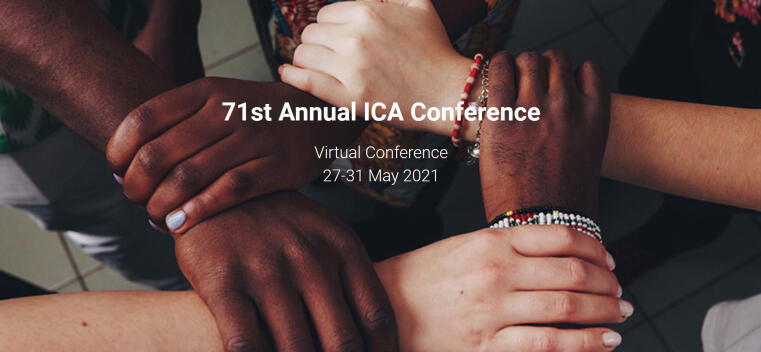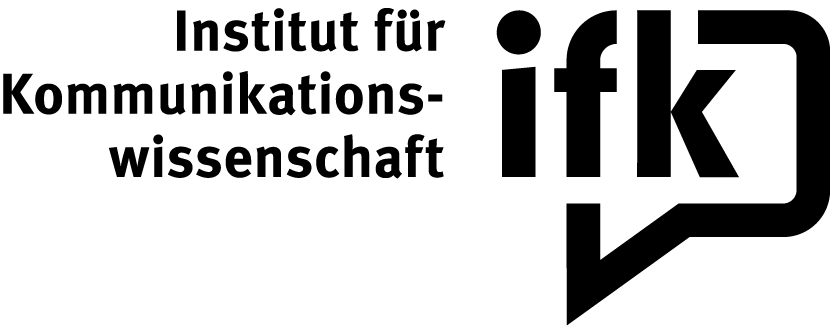
IfK mit 21 Beiträgen auf der 71. Jahrestagung der ICA vertreten
(25.05.2021) Die diesjährige 71. Jahrestagung der International Communication Association (ICA) mit dem Schwerpunktthema „Engaging the essential work of care: Communication, connectedness, and social justice“ findet vom 27.-31. Mai als virtuelle Konferenz statt. Forscher*innen des Instituts für Kommunikationswissenschaft sind mit 21 Beiträgen vertreten.
Unter dem Titel „Engaging the essential work of care: Communication, connectedness, and social justice“ befasst sich die diesjährige ICA-Jahrestagung mit dem Konzept der Sorge und Fürsorge als Kernaspekt des sozialen Lebens vor dem Hintergrund der Corona-Pandemie, der Klimakrise und gesellschaftlichen Konflikten auf der ganzen Welt.
Das Maß an Sorge oder Fürsorge auf der individuellen und der kollektiven Ebene innerhalb einer Gesellschaft ist bezeichnend für ihre Werte, Erfahrungen, Position und Geschichte. Vor dem Hintergrund der zahlreichen Krisen, mit denen Gesellschaften zum gegenwärtigen Zeitpunkt umgehen müssen, stellt Kommunikation ein Mittel zur Neuaushandlung von Sorge und Fürsorge dar. Sorge und Fürsorge sind sowohl durch Kommunikation erzeugt als auch grundlegend für Kommunikation.
Mit 11 Pre- und Post-Conferences findet die Konferenz vom 27. bis zum 31. Mai statt. Unter den angenommenen Beiträgen für die diesjährige Konferenz sind 22 Beiträge von oder mit Beteiligung von IfK-Wissenschaftler*innen:
- Why do people spread distorted information online? An examination of predictors based on the theory of collective action.
Florian Wintterlin; Tim Schatto-Eckrodt; Lena Frischlich; Svenja Boberg; Felix Reer; Thorsten Quandt - The seed of doubt: The role of alternative and established news media in the early moments of a new conspiracy theory.
Tim Schatto-Eckrodt; Lena Clever; Lena Frischlich - Fueling the Information Disorder? Alternative News Media in the COVID-19 Crisis.
Lena Frischlich; Tim Schatto-Eckrodt; Lara Kuhfeldt; Lena Clever - Sowing distrust on a fertile ground – how distorted alternative news fuel negative attitudes towards political candidates amongst ausceptible recipients.
Lena Frischlich; Jens Hellmann; Felix Brinkschulte; Martin Becker; Mitja Back - Entertained by extremists: staging and effects of eudaimonic instagram propaganda.
Lena Frischlich; Jana Johanna Klapproth; Tobias Kleineidam; Tim Schatto-Eckrodt - Addicted to digital games? A representative survey study on the societal perception of gaming disorder.
Felix Reer; Florian Wintterlin; Thorsten Quandt - A longitudinal study on smartphone use disorder and psychosocial well-being.
Felix Reer; Ruth Wendt; Thorsten Quandt - Cyberbullying victimization and mental health: A representative cross-sectional study of German Internet users.
Robin Janzik; Felix Reer; Ruth Wendt; Thorsten Quandt - Gender, gaming motivations, and genre: comparing singaporean, german, and american video game players.
Rabindra Ratan; Vivian Hsueh Hua Chen; Frederik De Grove; Johannes Breuer; Thorsten Quandt; Patrick Williams - The ebb and flow of corona coverage: a time-based analysis of news media’s crisis coverage during the first 9 months of the covid-19 pandemic.
Thorsten Quandt; Svenja Boberg - Covid, confusion and conspiracies: A longitudinal content analysis of alternative media’s coronavirus coverage and its impact on the media landscape.
Svenja Boberg; Thorsten Quandt - Fatigued by ongoing news issues? How repeated exposure to the same political issue affects the audience.
Julia Metag, Gwendolin Gurr - Examining avoidance of ongoing political issues in the news: a longitudinal study of the impact of audience issue fatigue.
Gwendolin Gurr; Julia Metag - From traditional to automated news: how did sports coverage change in the past 100 years?
Jessica Kunert; Thomas Birkner; Annika Keute - Historical change and journalistic norms: a hundred years of writing the news.
Annika Keute; Thomas Birkner - Emotion-inducing content in crisis coverage.
Valerie Hase; Katherine M. Engelke - Performing opinion leadership communicatively: how opinion leaders deal with media content in everyday conversations.
Nicole Podschuweit; Stephanie Geise - Do protest images mobilize people? How news images of protest issues and protest activities induce emotions and affect participatory intents.
Stephanie Geise - Parties’ trust in big data technology for political micro-targeting: A qualitative analysis.
Natascha Löffler - The impact of the employer’s perceived trustworthiness on supportive behavioral intention during the COVID-19 pandemic: The mediating role of internal communication.
Natascha Löffler; Sarah Ecklebe; Anna Dudenhausen; Ulrike Röttger - Waves of Attention to Racial Injustice on Social Media: Cases of Extrajudicial Police Killings in the United States.
Annie Waldherr; Ryan Gallagher; Nicola Righetti, Kira Klinger; Daniela Stoltenberg, Sagar Kumar; Dominic Ridley; Brooke Foucault Welles
Die International Communication Association (ICA) wurde im Jahr 1950 gegründet und ist seit 2003 als Non-Governmental Organisation (NGO) mit den Vereinten Nationen (UN) assoziiert. Als Fachverband mit Hauptsitz in Washington D.C. gehört die ICA zu den wichtigsten wissenschaftlichen Austauschplattformen im Bereich Medien- und Kommunikationsforschung und hat inzwischen über 4.500 Mitglieder aus 85 Ländern. Die nächste Jahreskonferenz findet 2022 in Paris, Frankreich statt.

